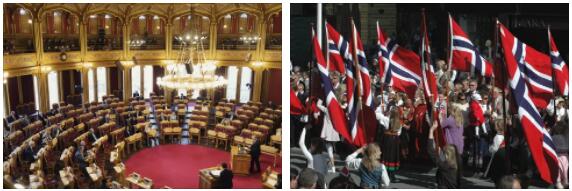After the end of the Cold War and the transition to a post-bipolar system, Norway’s participation in the processes of global internationalization and regional integration deepened. The previously dominant “Atlantic” direction of foreign policy has lost its defining role. The Norwegian policy – “basic” and “nuclear”, which declared the rejection of the deployment of foreign troops and nuclear weapons in the country in peacetime, is now removed from the political agenda by the authorities. The erosion of “Atlanticism” is associated with a change in the country’s strategic role and a reduction in Norway’s military efforts in NATO. The importance of Norwegian infrastructure for US strategy and NATO as a whole has declined. However, the country’s leadership seeks to maintain the “special” Norwegian-American relations under any conditions. Check computerminus for political system of Norway.
A growing role is played by the “European” direction. Despite the forced refusal of the country’s accession to the EU and the resulting difficulties in relations with the main allies in Europe, Norway is actively developing cooperation with the EU. In 1973, an agreement on free trade in manufactured goods was concluded, and in 1994, an agreement on the European Economic Area. Within the framework of the mechanism of European political cooperation, Norway, relying on its oil factor, effectively ensures the national-state interests, although it does not take part in the EU decision-making process.
The “northern” direction, which the country implements through the Nordic Council, retains its significance. In the 1990s The cooperation of the countries of the North was carried out mainly with the Baltic States and within the framework of the EU Northern Dimension program.
Norway is one of the founding countries of the UN. Norwegian Trygve Lie was elected its first general secretary. Oslo considers the UN as the main body for the maintenance of international law and order and the system of international security. Norwegian diplomacy played an important mediating role in resolving conflicts between the PLO and Israel, in Honduras and Sri Lanka. Norway takes a constructive position on the development problems of the Third World countries, it is among the few developed countries that provide 1% of GNP in the form of assistance to developing countries.
The armed forces of Norway are in the process of reorganization, they consist of the Land Forces – the Ground Forces, the Air Force, the Navy and the Heimvern (National Guard). The number of permanent staff is 27 thousand people. and 220 thousand people. in reserve. Military spending US$3.2 billion, 2.1% of GDP (2002). Although the recruitment of the Armed Forces on the basis of the law on universal military service (conscription age of 20 years) is preserved, out of the annual conscription contingent of 27 thousand people. only 10,000 are called up for active service (12 months).
The leadership exercised by the Commander-in-Chief through the Joint Headquarters and the Directorate of Inspectors General of the Services of the Armed Forces is undergoing changes in the direction of strengthening the role of territorial defense regions.
Norway has diplomatic relations with the Russian Federation. In September 1921 Norway recognized Soviet Russia de facto, and in February 1924 recognized the USSR de jure. Relations between Norway and Russia have existed since ancient times, they have never been at war. In 1905, Russia was the first of the great powers to recognize the independence of Norway. In Russia, F. Nansen, the organizer of the international campaign to help the starving in 1921–23, is remembered with gratitude. A bright page in the history of relations is the combat brotherhood during the 2nd World War.
During the Cold War, Soviet-Norwegian relations experienced a difficult period. In November 1955 Prime Minister E. Gerhardsen made an official visit to the USSR, and in 1964 N.S. Khrushchev and in 1971 L.I. Brezhnev in Oslo. In the 1970-80s. 60 interstate and intergovernmental agreements and treaties were signed. A separate page was the meeting on December 5, 1986 M.S. Gorbachev with Prime Minister Gro Harlem Brundtland (CHP).
With the formation of the Russian Federation, productive ties were resumed in various fields. The contacts culminated in the visits of President B. Yeltsin to Oslo in 1996 and the King of Norway to Moscow in May 1998. An important event was the official visit to Oslo of the President of the Russian Federation V. Putin (November 2002), following his negotiations with Prime Minister Kjell Magne Bunnevik A joint statement was signed in which the parties agreed to expand cooperation in the northern region.
For 30 years, consultations have been held between the interested departments of the USSR, and later the Russian Federation and Norway, on resolving issues of delimitation – the delimitation of the Barents Sea, which cover 155 thousand km2, and fixing the dividing line with a length of 1700 km. Thanks to mutual concessions and compromises to the beginning. 2003 discussion is about 5% of the disputed water area and shelf.
